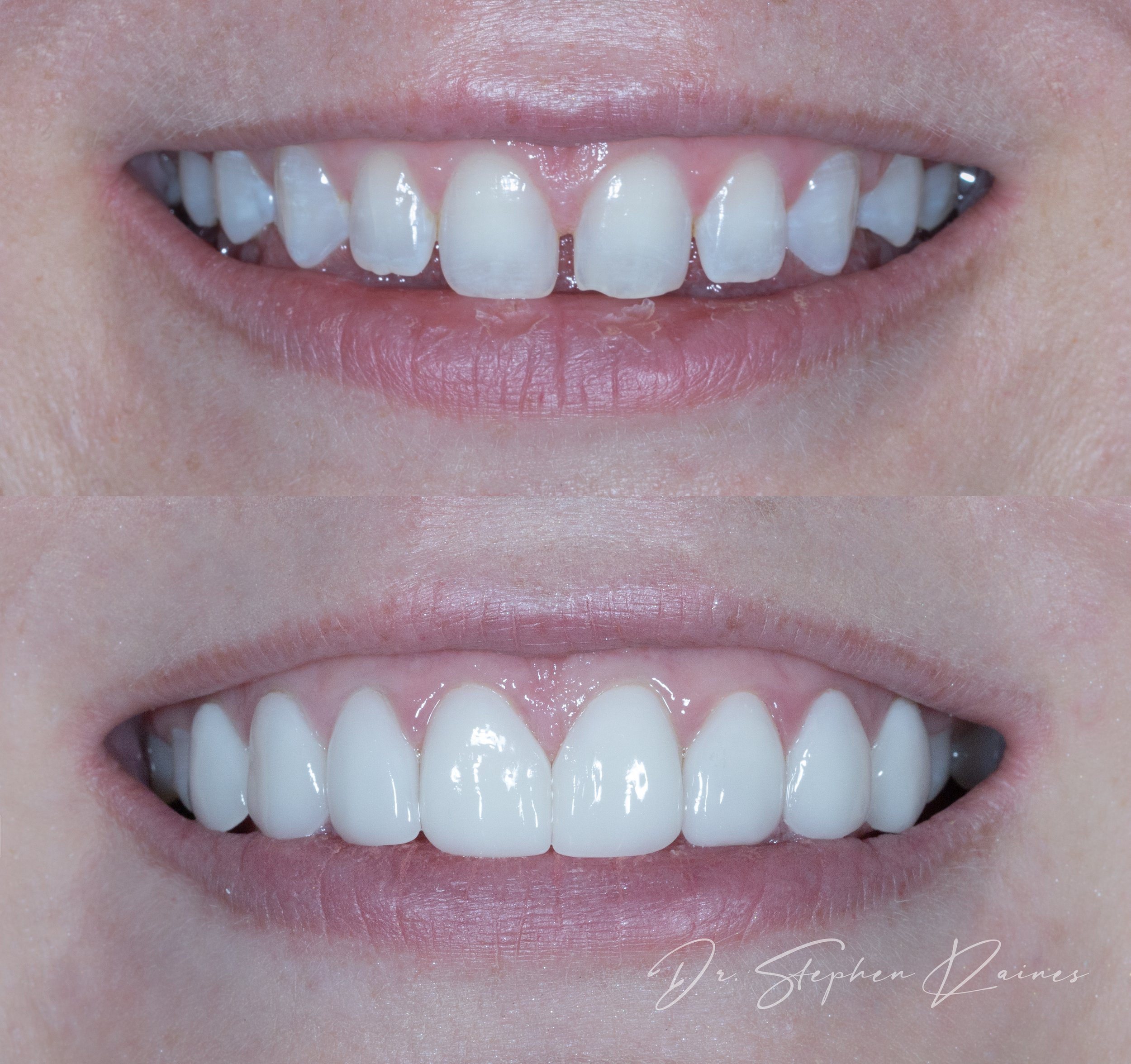Overview
The most common phrase we hear from our patients after getting their veneers is “I wish I would have done this a long time ago”. Veneers are a life changing, minimally invasive solution to provide patients with the smile of their dreams. Made from esthetic reinforced porcelain that is bonded to the existing teeth, veneers can dramatically change a smile in only two appointments. Typically veneers require minimal reduction to the existing tooth structure and sometimes can be done without preparing the teeth at all. This means that if and when the veneers need to be replaced or removed, you simply go back to the teeth as they were before. One myth about veneers, is that they have to be replaced every 5-10 years. With proper home care and routine cleanings, veneers can absolutely last 20+ years.
How much does it cost?
Our veneers are $1200 each (*as of May 2024 and subject to change in the future) and the majority of our cases involve 8 upper veneers. When patients ask “how many do I need?” my response is always to ask “what shows when you smile?”. Sometimes the answer is 8, sometimes its 10 or 12, and occasionally when the lower teeth are involved we may do up to 20 total; its all up to you and we are happy to discuss these options with you at your first appointment so that you can make this life changing decision with the most information possible to ensure we deliver the most spectacular results.
What does the process look like from start to finish?
At your first appointment we will take digital impressions or scans, as well as a series of pictures, and use that to provide you with a digital mockup of what is possible at your next appointment. We compare this next step to test driving a car, and it is what we feel sets up apart from other practices. It is so important to have some mental closure before doing anything permanent. You’ll be able to walk out with your “prototype” veneers and get feedback from friends and family on your new smile and things you would like changed about the final work.
Once you’ve given us the green light to proceed with your final veneers we will either have them made or we will do whatever prep work needs to be done if necessary on existing teeth. If we do need to do any prep work such as cavity removal or minimal reduction of teeth, you will still leave with custom temporary veneers to wear while the permanent veneers are being made.
At your last appointment we will remove the temporary veneers and permanently bond the final ones.
Do my teeth have to be shaved down prior to getting my permanent veneers?
Sometimes the answer is yes, and sometimes the answer is no. In the picture show here, now shaving or drilling was necessary, so the natural teeth were not touched at all in this transformation. We will make that determination at your first appointment so that you are aware of what needs to be done and why. We always want to do the absolute minimal amount of drilling necessary so that no unnecessary removal of healthy tooth structure is done. If we do require tooth preparation, don’t be alarmed, it will be very minimally invasive and your natural teeth will not be harmed by the work we will be doing.
Here are some of the reasons we may recommend tooth preparation prior to delivery of your veneers:
There is existing decay (or cavities) that need to be removed
The existing teeth are too crowded or flared out to allow us to provide a final result that is natural, symmetrical, and proportional.
There are existing veneers or bonding present that need to be removed to allow the final restorations to match
How long will they last?
One myth about veneers, is that they have to be replaced every 5-10 years. With proper home care and routine cleanings, veneers can absolutely last 20+ years. It all depends on patient motivation at home and consistency with cleanings every six months.
How strong are veneers vs. crowns?
Many patients have heard or even know someone personally that has a story about veneers breaking or cracking. There are a lot of factors that can cause any sort of dental restorations to break or crack and this is not exclusive to veneers. Crowns and fillings have the potential to break or crack as well. However, we are highly trained in making this scenario something that you can avoid. In short, the strength of your veneers depends greatly on the techniques used when bonding the veneers (rather than the strength of the material itself) and managing any excessive bite forces that could cause harm to your new smile. All of our veneer patients get a nightguard to sleep in included in their treatment; this helps protect your investment.
